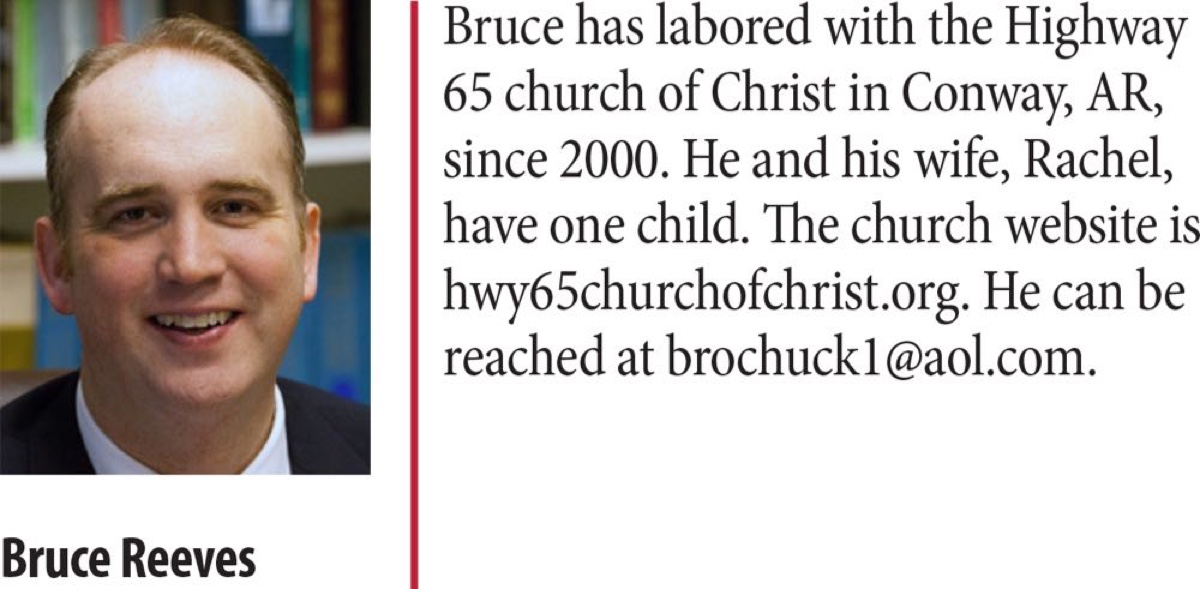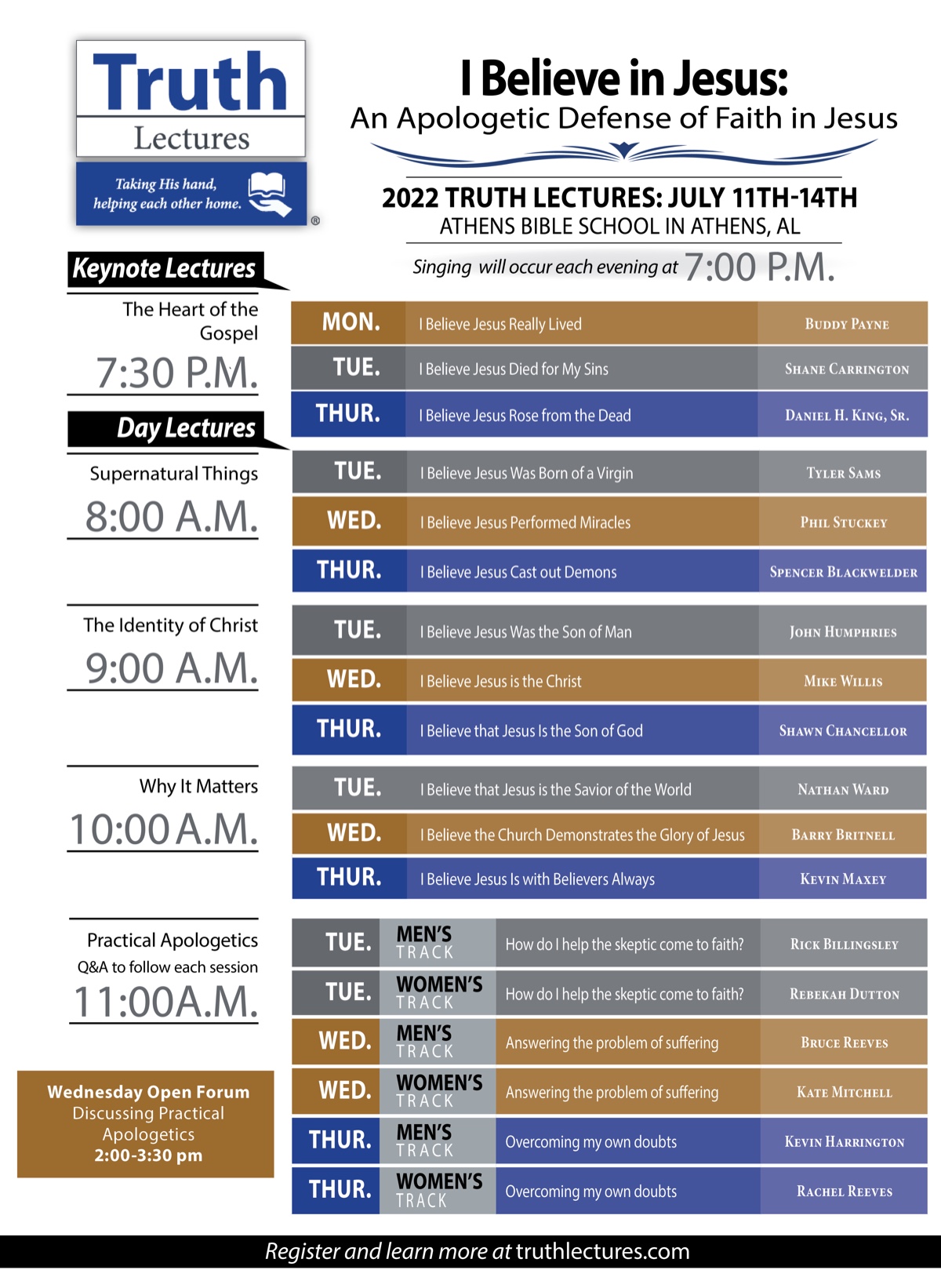By Bruce Reeves
Synopsis: Why would anyone believe the depraved and dark view that Calvinism holds of God? Thankfully, we have a heavenly Father who loves us and desires our salvation in Christ.
Classic Calvinists believe that “God is the first cause of evil,” “the devil is God’s devil and does what God commands him to do,” and that “the god of the Bible” has irrevocably and unconditionally predetermined the salvation of individuals, regardless of what they do. Why would anyone accept and promote such a depraved and dark view of the God of heaven?
Informed Calvinists openly admit that the most contested territory in the debate over Reformed Theology is Romans 9 (Sproul, 151). A comprehensive consideration of biblical teaching reveals that the premises and consequences of Calvinism are erroneous and unbiblical. Furthermore, it is a grave mistake to isolate Romans 9 from the rest of the epistle and its theme of unity through faith in Christ (Rom. 1:16-17; 5:6-8).
Romans 9-11 must be understood as a single cohesive argument forming the climax of Romans 1-11. After having shown that both Jews and Gentiles were guilty before God and in need of salvation through Christ, Paul anticipates and answers Jewish objections to the message of the cross (Rom. 1:16-17; 3:9, 19-20, 23; 5:1-2).
The biblical text under consideration addresses the most prominent Jewish objections to the gospel. All centered on the singular truth of God’s expression of mercy to the Gentiles and the Jews. In doing so, Paul offers an inspired response to those who would attempt to restrict God’s mercy to physical Israel (Rom. 1:16-17; 11:32).
The introductory statements of this section frame the rest of the discussion of God’s eternal purpose in Christ. Paul writes, “I tell the truth in Christ, I am not lying, my conscience also bearing me witness in the Holy Spirit, that I have great sorrow and continual grief in my heart. For I could wish that I myself were accursed from Christ for my brethren, my countrymen according to the flesh” (Rom. 9:1-3). Why would he have such sorrowful grief over Israel being lost if the doctrine of unconditional election were true? Paul’s sincere desire for the redemption of all men harmonizes with God’s love for all humanity (Rom. 10:1-3; 11:15; John 3:16; 1 Tim. 2:4; 2 Pet. 3:9).
The apostle describes his sadness over his Jewish brethren’s rejection of the Christ. The Lord’s divine purpose in the choosing of physical Israel was for the redemption of all those who would believe (Rom. 9:30-33; 10:20-21). Paul was fully aware of the blessings of the Jewish heritage: “Who are Israelites, to whom pertain the adoption, the glory, the covenants, the giving of the law, the service of God, and the promises; of whom are the fathers and from whom, according to the flesh, Christ came, who is over all, the eternally blessed God. Amen” (Rom. 9:4-5; cf. 3:1-2). God chose Israel to bring the Messiah into the world to bless all who would seek Him by faith, but they were the very ones who rejected the promised Christ (Rom. 1:1-5).
“If the Gospel Is True, Then God Has Been Unfaithful To Israel” (Rom. 9:6-13).
Paul answers the Jewish accusation that the gospel would result in the Lord being unfaithful to His promise to Israel by demonstrating that His word had not failed in any way:
But it is not that the word of God has taken no effect. For they are not all Israel who are of Israel, nor are they all children because they are the seed of Abraham; but “In Isaac your seed shall be called.” That is, those who are the children of the flesh, these are not the children of God; but the children of the promise are counted as the seed. For this is the word of promise: “At this time I will come, and Sarah shall have a son” (Rom. 9:6-9).
God had not failed in His promise, but the Jews had developed a false sense of security based on their misunderstanding of the promise. Not all of those who were members of physical Israel were a part of spiritual Israel (Rom. 9:6). Paul clearly distinguishes between the “children of the flesh” and the “children of the promise.” The “children of the promise” are the true seed. Those who believe in Christ are the spiritual descendants of Abraham:
Therefore, be sure that it is those who are of faith who are sons of Abraham. The scripture, foreseeing that God would justify the Gentiles by faith, preached the gospel beforehand to Abraham, saying, “All the nations will be blessed in you.” So then, those who are of faith are blessed with Abraham, the believer. . . Christ redeemed us from the curse of the Law, having become a curse for us—for it is written, “Cursed is everyone who hangs on a tree”—in order that in Christ Jesus the blessing of Abraham might come to the Gentiles, so that we would receive the promise of the Spirit through faith. . . and if you belong to Christ, then you are Abraham’s descendants, heirs according to the promise (Gal. 3:7-9, 13-14, 29).
Paul employs Hebrew parallelism and reverses oppositional phrases to emphasize his point. He uses the term “seed” in two different ways to show that the Jews had missed the application of the promise. One time Paul uses the phrase “seed of Abraham” to reference physical Israel (9:7), whereas he uses the phrase “counted for the seed” (9:8) to reference those who are spiritual Israel. Thus, He distinguishes between the “children of God,” as believers, and the “children of the flesh,” as national Israel (Rom. 4:11,12,16). His readers needed to understand that it was not physical descent, but spiritual descent, that constitutes the faithful of God (Rom. 2:28-29).
Isaac was not personally and unconditionally chosen for salvation before the foundation of the world, but he was saved from his sins by faith (Heb. 11:20) [see Note #1] Paul’s point in Romans 9:9 is not Isaac’s salvation, but God’s decision that he be a part of the lineage that brought the Messiah into the world: “For this is the word of promise, ‘At this time I will come, and Sarah shall have a son’” (Rom. 9:9, cf. Gen. 18:14). Again, it must be emphasized that the phrase, “word of promise,” identifies the provision of the Messiah for the whole world through the Jewish people: “Sarah shall have a son.”
God’s word did not fail! Physical Israel fulfilled the purpose for which God had chosen her as a nation. The divine purpose and choice of God was to bless all nations through the seed of Abraham (Gal. 3:29). This choice would be accomplished through the lineage of Jacob, not Esau. Paul quotes from the Old Testament: “And not only this, but when Rebecca also had conceived by one man, even by our father Isaac (for the children not yet being born, nor having done any good or evil, that the purpose of God according to election might stand, not of works but of Him who calls), it was said to her, ‘The older shall serve the younger.’ As it is written, ‘Jacob I have loved, but Esau I have hated’” (Rom. 9:10-13).
The unbelief of Israel would not alter God’s offer of mercy to all nations through Christ. Paul wrote, “For what if some did not believe? Shall their unbelief make the faith of God without effect? (Rom. 3:3). The Lord’s choice to use ethnic Israel to fulfill His purpose was not dependent upon her goodness or evil, works or lack of the same—but on His covenant faithfulness (Rom. 9:16; 11:28).
Those who argue that this passage refers to God’s unconditional election of individuals to salvation do so despite the context, not because of it. Paul’s statement that “the older will serve the younger” is a quotation from Genesis 25:23, which states, “The LORD said to her: ‘Two nations are in your womb, two peoples shall be separated from your body; one people shall be stronger than the other, and the older will serve the younger.’” Historically, Esau never personally served Jacob, yet the Edomites, as Esau’s descendants, did serve Israel as the descendants of Jacob (Gen. 33:4-5; 2 Sam. 8:13-14).
Scripture shows that God’s love for Jacob and hatred of Esau refers not to their personal salvation but to His blessing upon the nation of Israel. Long after the decease of both Jacob and Esau, the prophet Malachi records:
“I have loved you,” says the LORD. Yet you say, “In what way have you loved us?” “Was not Esau Jacob’s brother?” says the LORD. “Yet Jacob I have loved; but Esau I have hated and laid waste his mountains and his heritage for the jackals of the wilderness” (Mal. 1:2-3).
So why do we read of Isaac being chosen over Ishmael and Jacob being chosen over Esau? It was important for Israel to understand that even their place in the provision of the Messiah was by God’s sovereign choice. The ones not chosen (Ishmael and Esau) are not thereby condemned to hell; rather, they are simply excluded from having a part in God’s redemptive plan. The Lord has the sovereign right to choose how He will work out His redemptive purposes and through whom He does so.
If the election of Romans 9:11 is that of personal salvation, then there are grave consequences regarding God’s nature, because the choosing of this verse was not based on any good or evil that Jacob or Esau did. The logical conclusion for proponents of Calvinism is that, ultimately, those who are condemned to hell are not condemned because of their “evil,” but because God did not have any redemptive love for them.
Stephen Garrett, a Calvinistic Baptist, in expressing his view of Romans 9, said, “Brother, when you talk about God loving somebody and God hating somebody, are you not talking about eternal salvation? He hated Esau before He was born, and he says it was not based on any evil that he did” (Reeves-Garrett Debate, Garrett’s Third Negative, 2010).
Gene Cook, Jr., a well-known defender of Reformed Theology, when asked about infants and the Calvinistic interpretation of this context said:
“Non-elect infants who die in their infancy will spend eternity in hell”—I would answer true to that question, you have to be elect in order to be saved. If this question is false, then we should perform abortion, because abortion is the greatest evangelistic act that has ever taken place since the time that Jesus walked the face of the earth, because every one of those children are going straight to heaven according to Mr. Brown’s theology (Cook, 150).
When that quote was played during our debate in 2005, Gene Cook replied:
So, when he (Bruce Reeves) stands over here, and says, “His (Gene Cook, Jr.) God is a monster, his God is not fair, his God sends little babies to hell. . . there is nothing they can do about it,” he (Bruce Reeves) is really arguing against the God of the Bible. . .” (Cook, 174).
You just got up and heard Mr. Reeves make the argument that my version of God is a God who puts one baby on the saved list and another baby not on the saved list and I’m going to show you from Romans chapter nine that that’s what the Scripture says (Cook, 172).
Here it becomes painfully obvious that Calvinistic theology must ignore both the immediate and remote context of Scripture to uphold its position. Those who are willing to abuse this chapter to teach unconditional election take unwarranted liberties with the Bible for one reason and one reason alone: to affirm their theology. The fundamental problem is that the Calvinist does not come to Romans 9 in an unbiased fashion because of his view of God’s sovereignty, unconditional election, and humanity’s total inability to choose faith. In many ways, they put all their eggs in the basket of Romans 9. It is my conviction that this very text may be the key to removing the underpinnings of Calvinism, which is a false view of God’s sovereignty and saving election!
The application of Romans 9 to unconditional election violates the very point that Paul was trying to make to the Jews: that God intended Israel to be the conduit for the provision of salvation for all who would believe. Those who say that “God provided salvation for all men,” but foreordained from eternity that they would not (and could not) respond, are guilty of illogical double-talk to avoid the necessary conclusion of their teaching [see note #2]. Interestingly, Paul is rebuking the Jewish desire for unconditional, nationalistic election, and some have adopted the general tone of their argument. Thank God we have a heavenly Father who loves us and desires our salvation in Christ. Let us praise God for His glorious grace!
Note #1: In Ephesians 1:1-13 the apostle Paul argues that God, before the foundation of the world, chose that all those who would exercise faith in His Son would be His “chosen” or “elect” people. Unbelievers are never described as being God’s elect in Scripture, because such individuals are not yet in Christ (1 Cor. 12:12-13). God’s people are “elect” because of their union with His “chosen” Son (Isa. 42:1-2). We choose whether we are “in Him” through obedience to the gospel (Rom. 6:3-4; Gal. 3:27; 2 Thess. 2:13). The Lord determined the category of persons, the relationship and sphere, and even the conditions of salvation. Yet, He did not predetermine the specific individuals who would be saved but offered the gospel to all (Mark 16:15-16; 1 Pet. 1:2; 2 Pet. 3:9).
Note #2: Stephen Garrett has written on his blog, BaptistGadfly, “I am confirmed in my ‘five point’ Calvinism, although I have come to see how God has a general love for all men and has provided salvation for every man.”
Cook, Gene, and Bruce Reeves. Reeves-Cook Debate on Baptism. Bowling Green, KY: Guardian of Truth Foundation, 2006.
Garrett, Stephen and Bruce Reeves. Reeves-Garrett Debate on Election. [Reeves’s Third Affirmative] Tuesday Night, November 9, 2010. https://www.youtube.com/watch?v=PYo3bEtW77E.
Garrett, Stephen and Bruce Reeves. Reeves-Garrett Debate on Election. [Garrett’s Third Negative] Tuesday Night, November 9, 2010. https://www.youtube.com/watch?v=2hPd7bTKNv8
Garrett, Stephen. “BaptistGadfly: 4th Year Anniversary!” BaptistGadfly (blog), July 5, 2010. http://baptistgadfly.blogspot.com/2010/07/4th-year-anniversary.html.
Sproul, R.C. Chosen By God. Wheaton, IL: Tyndale House, 1986.



